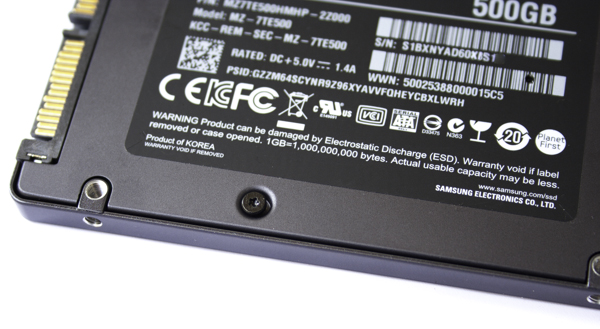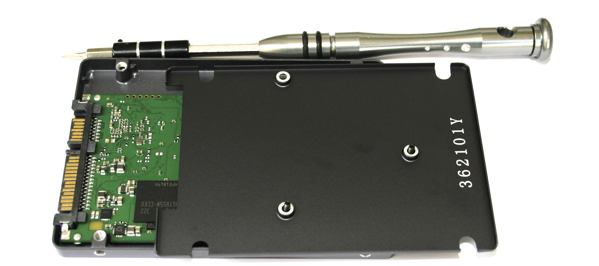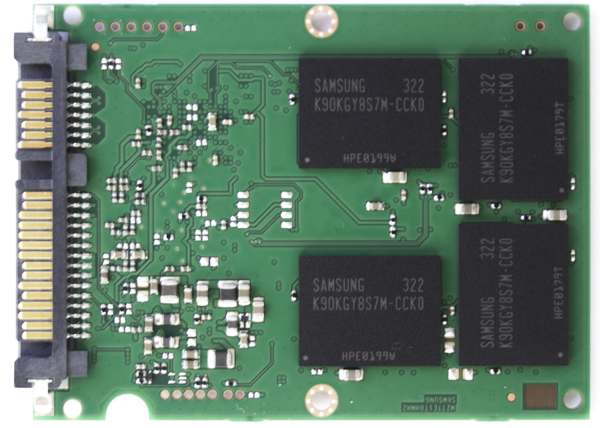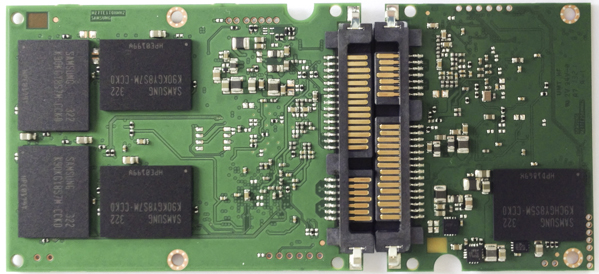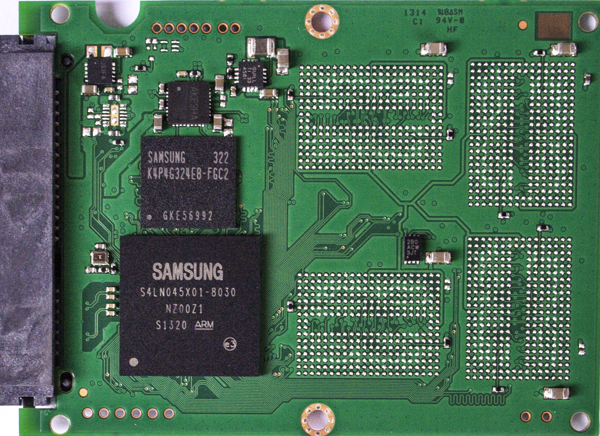Samsung 840 EVO SSD: Tested At 120, 250, 500, And 1000 GB
Last week, Samsung unveiled a successor to its wildly popular 840 at the company's Global SSD Summit in Seoul, South Korea. Stacked with a series of new features and 19 nm, three-bit-per-cell NAND, we benchmark four models and make a recommendation.
Inside Samsung's 840 EVO
Getting into the svelte gunmetal-grey chassis is a snap, so long as you have a #5 pentalobe screwdriver handy. You'll find two screws under the label and one that's plainly visible. Don't even bother removing the label; just push the bit right through it.
There are no thermal pads, stickers, or adhesives under the cover. The drive's top, circuit board, and bottom separate as easily as oil and water.
This is the 500 GB model's PCB. Samsung's 120 GB drive is actually shorter, as you can see in the side-by-side shot below. Each NAND package plays host to eight dice, except on the 120 GB drive, which uses two quad-die packages. Otherwise, each package's octet of 128 Gb Toggle-mode NAND delivers 128 GB capacity.
The MEX 400 MHz triple-core Cortex-R4-based controller is labeled S4LN045X01-B030. This new revision runs 100 MHz faster than the older 840's processor, and will also be able to apply Opal 2.0-compatible encryption, either through the drive itself or through Windows 8's BitLocker Drive Encryption, once an upcoming firmware update is certified. This is big news in the self-encrypting drive space, since there aren't many desktop drives with Opal 2.0 support yet. Naturally, this will change as competing vendors refresh their product lines.
Lastly, we see the drive's LPDDR2 DRAM cache. In the picture of the 500 GB 840 EVO, it's a 512 MB package. Samsung is deploying 1 MB of cache for every gigabyte of capacity, which is fairly standard these days.
Get Tom's Hardware's best news and in-depth reviews, straight to your inbox.
Current page: Inside Samsung's 840 EVO
Prev Page The 840 EVO's Bag Of New Tricks Next Page Test Setup And Benchmarks-
Someone Somewhere Surely it would make sense to compare it to the vanilla SSD840. Also, there's no 840 Pro in the power charts.Reply
While the 1TB drive coming down to ~65c/GB is nice, seeing the 120 GB drives get near there would be nice. Especially since this is meant to be the value king. -
drwho1 I have 2 840 pro 512 GB SSD's (1 on my notebook 1 on my PC)Reply
I got them on a sale on Newegg for around $500 for both of them. :)
A 1TB would be cool if I find it on sale....
or maybe I should try out writing a letter to someone fat in some weird red costume...
-
slomo4sho The performance gap between the 840 Evo and 840 Pro is discouraging for the lower capacity models. I understand that the Pro is the flagship product but I was expecting less of a gap in in the 120GB models since this is a newer generation product and the 840 Pro is still based on the 21nm MLC NAND. However, the 1TB model is is a great choice for mass SSD storage. Lets hope the prices drop below $0.50 per GB soon.Reply -
Someone Somewhere MLC is faster than TLC, and bigger node NAND is usually faster. Only reason to go smaller is price and power.Reply -
SteelCity1981 I wonder if samsung plans on releasing a pro evo series since the regular series evo is to replace the older non pro versions.Reply -
razor512 ripoff, high prices for triple level flash especially at 19mm, the lifespan will likely suck and their shortened warranty represents that.Reply -
master9716 Cost for performance = Very High . ofcourse its not going to perform like a Pro but for the cost im amazed its that much better than the Regular 840.Reply -
J_E_D_70 Glad this review also refutes the perception of low TLC write endurance in normal desktop workloads. Been using a 128GB 840 in a daily-use desktop for eight months now and the endurance counter hasn't decremented at all. I'll have replaced the entire rig long before it wears out.Reply -
JohnnyLucky Interesting review. I think the point to remember is that the 840 EVO is not a high end enthusiast ssd like the 840 Pro. Instead, consider the 840 EVO as a mainstream ssd suitable for most consumer and home office scenarios.Reply
